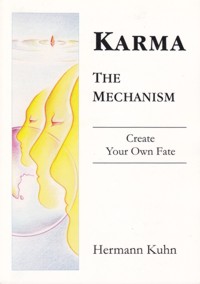
Kevali shruta sangha dharma devavarnavado darshanamohasya (13)
Doubt in (or a negative attitude towards)
- the omniscient (kevali)
- the knowledge contained in the scriptures (shruti)
- the fellowship of seekers for the ultimate freedom (sangha)
- the path to freedom from all karmic limitations (dharma) and
- the inhabitants of higher (celestial) regions (devas)
attracts karma that obstructs insight in and understanding of reality. (13)
In the Western hemisphere we generally have the idea that knowledge needs to be laboriously discovered by either experience, research, reflection or ingenious intuition. Yet knowledge how to reach freedom from karmic limitations - as described in the Tattvarthasutra - comes from an entirely different source. It originates in the omniscient, who laid it down on the basis of their own experience.
The omniscient - also called 'pathmakers' (tirthankaras) - are human beings who reached the state of omniscience[21] - the 13th stage of development - but refrained from achieving freedom from all karma to impart their know-how to others. They acquired special karma that enables them to teach from omniscience. The omniscient are not yet liberated, but their ultimate freedom is ensured once their special teaching karma is dissolved.
According to the Jains only very few achieve this status because an extraordinary stability of body and mind is necessary to retain the bodily form after reaching omniscience.[22]
The twenty-fourth and last tirthankara - Mahavira - was born 599 BC in Vaishali (India). He entered the path to ultimate freedom at the age of 30 and reached omniscience about 12 years later. He communicated his knowledge and experience for 30 years before he left his body at the age of 72. Mahavira's teaching vitalized the knowledge how to reach freedom from all karmic limitations and had profound influence up to the very present. During his presence as tirthankara he taught approximately half a million people and it is said that many of them reached ultimate freedom even during his lifetime.
The original knowledge of the omniscient was recorded by their immediate disciples. It penetrates all its consecutive manifestations (scriptures etc.) like a guiding light.
Doubt in the integrity of the origin and the manifestation of this knowledge blocks the dynamism and energy with which we progress on our path - as every doubt in the purpose of an action will make its success improbable.
Now - in the last three centuries the West cultivated a general attitude of skepticism towards any kind of information. And this certainly raises the basic question how the knowledge of the omniscient could possibly have been taught correctly by the many subsequent generations of disciples. Since only the omniscient had perfect understanding - would it not be probable that the imperfections of human nature prevented the flawless transmission of this wisdom throughout the ages? Would it not be perfectly appropriate and even necessary to doubt incorrect knowledge and those who teach it?
The answer is easy: All those who seriously apply this knowledge confirm that the path as it was charted by the omniscient is valid. They testify that their perceptions and results match what is described in the ancient scriptures.
There exists one mechanism that preserves the original purity of this knowledge: While progressing towards freedom from all karmic limitations we intuitively compare all information we receive with the latent, perfect knowledge within ourselves. This automatically eliminates and corrects all flawed information.[23] The farther we progress, the more transparent this process becomes. We experience this as sudden, clear and intuitive understanding where our mind and feeling intuitively reach new levels of insight. This type of deeper understanding - pramana - does not require outside proof.
This mechanism of comparing all information with the inner perfect knowledge is one of the main reasons why the teachings of the omniscient remained unchanged for thousands of years: they correspond to the experiences of those who pursue this path - corrections were never necessary.
Furthermore the omniscient, their knowledge and its communication are pure by definition alone. Everything that deviates from correct knowledge simply fails to agree with this classification.
It is safe to assume that the original knowledge and its channels of propagation have lost nothing of their immediacy and purity. The cause for doubt and uncertainty may rather be found in our own imperfect understanding than in the omniscient, their teaching or their channels of communication. Basic doubt that manifests in form of a negative attitude towards the integrity of the omniscient, their knowledge etc., blocks our access to deeper levels of understanding, where all our questions are answered intuitively and comprehensively. Our own negative attitude obstructs the very mechanism of gaining this flawless intuitive insight.[24]
Skepticism towards flawed or incorrectly communicated knowledge certainly will always be necessary. Yet this has nothing to do with the manifestation of distrust in the omniscient and their teachings etc. mentioned in the sutra.
There should also be no doubt that serious questions regarding this knowledge need to be explored and answered. We will reach ultimate freedom only when all doubts and uncertainties are successfully removed. Belief in any kind of dogma is neither precondition, nor desired, nor even supportive. Yet if our questions and doubts surface with a negative emotional attitude towards knowledge etc., then this negativity will fall back on us by blocking our very own mechanisms of understanding. The karma we attract this way only expresses our inner rejection of this knowledge.
True - i.e. integrated, intuitively applicable - knowledge always originates in the context of dynamic insight, where our mind suddenly reaches new levels of understanding. Constant questioning of the insights gained this way interrupts this process or slows it down. A positive or neutral attitude towards this mechanism supports the unfolding of more comprehensive understanding within us. We need this increasing comprehension to find our way to ultimate freedom in the clutter of activities of daily life.
 Hermann Kuhn
Hermann Kuhn
